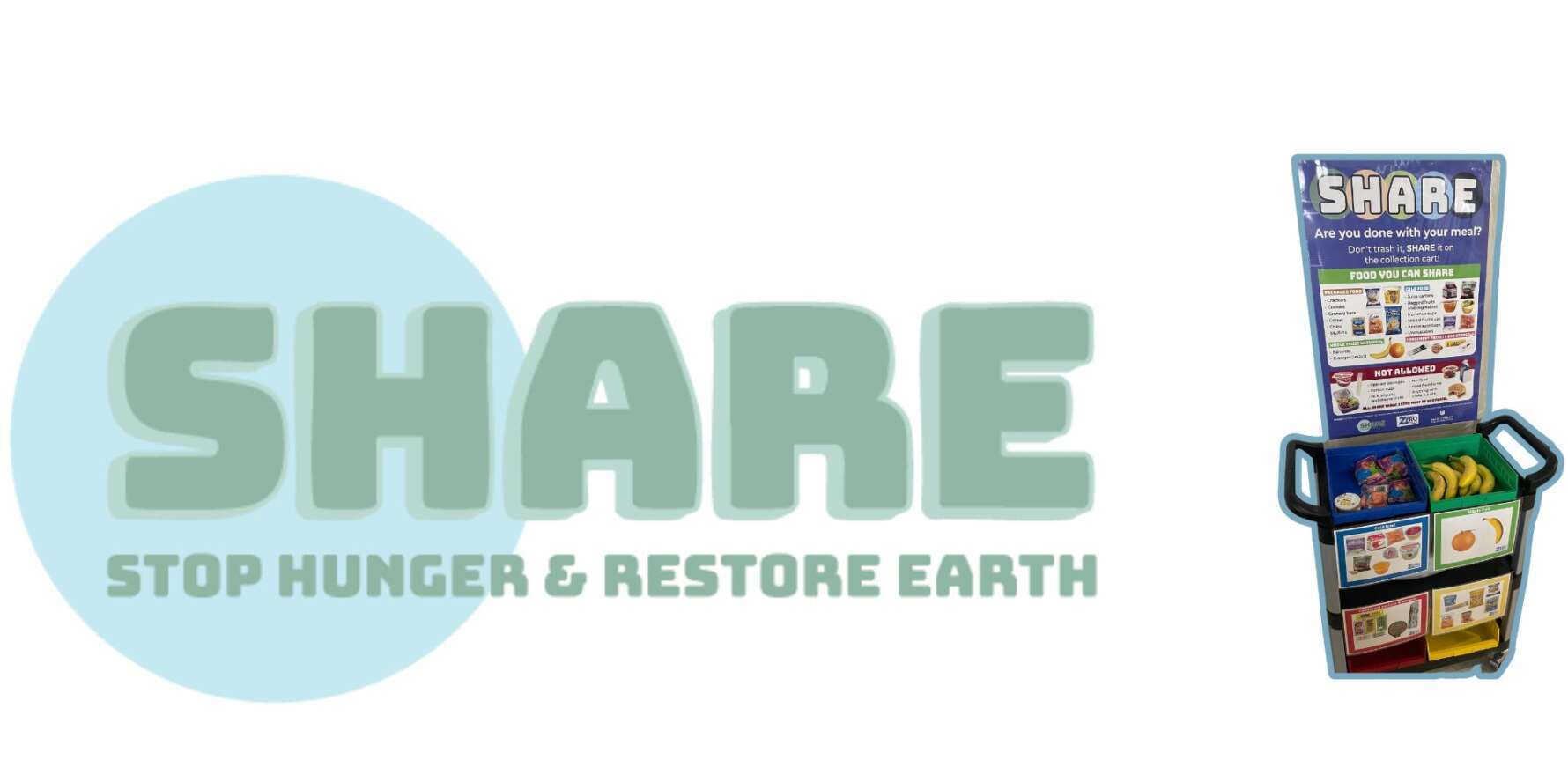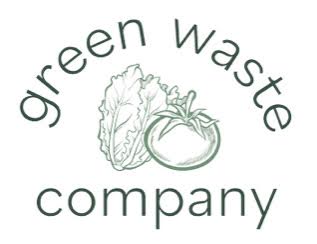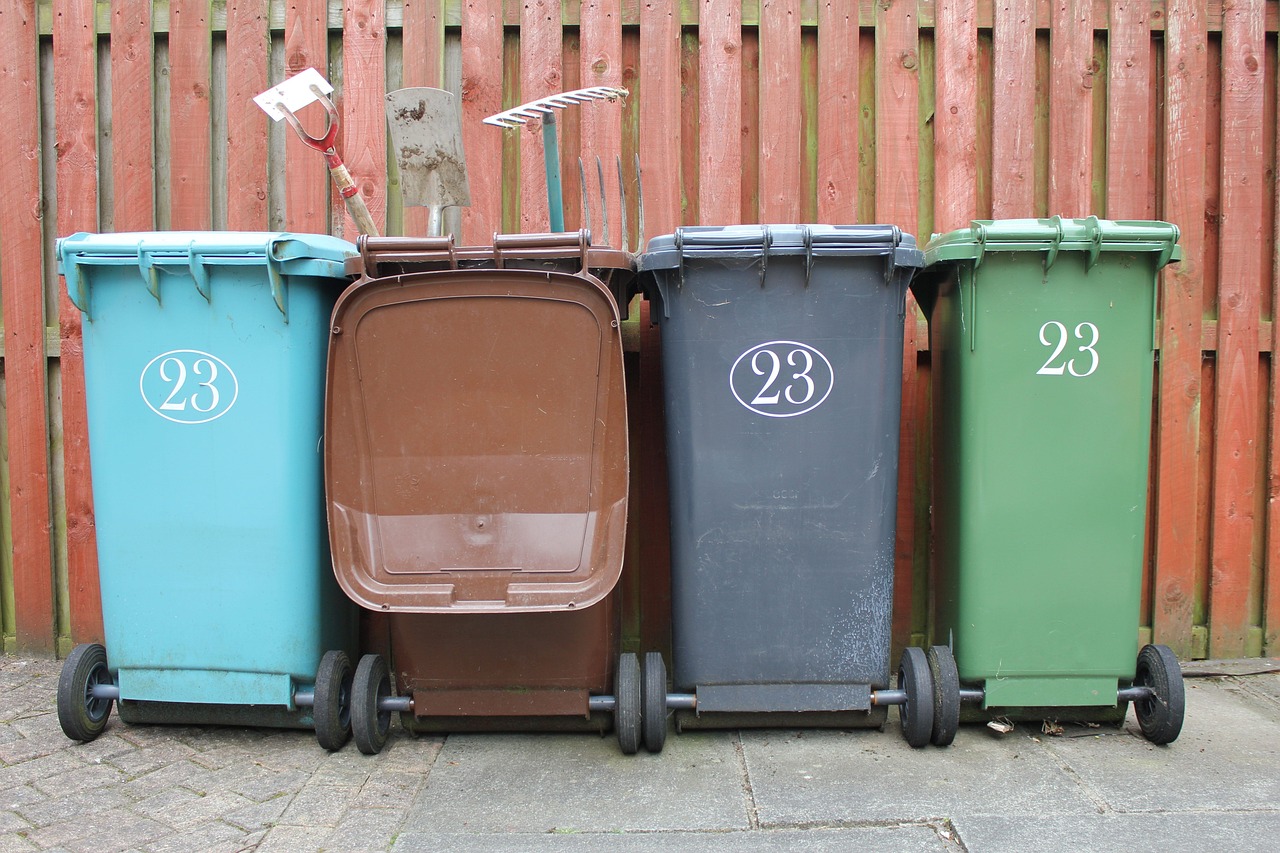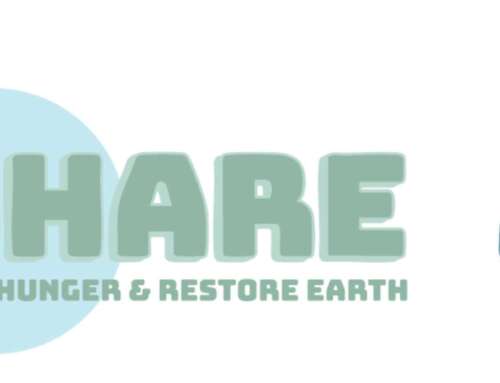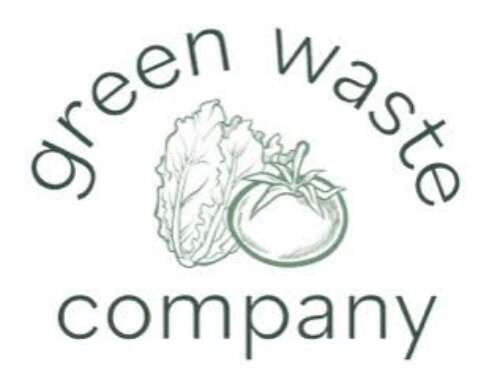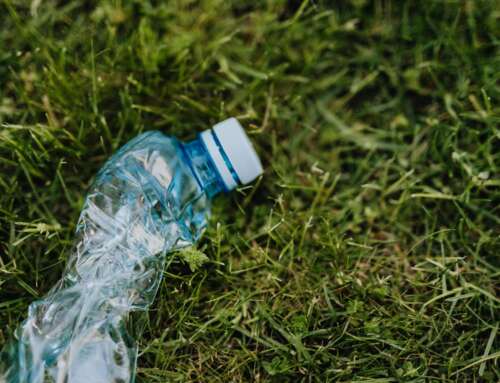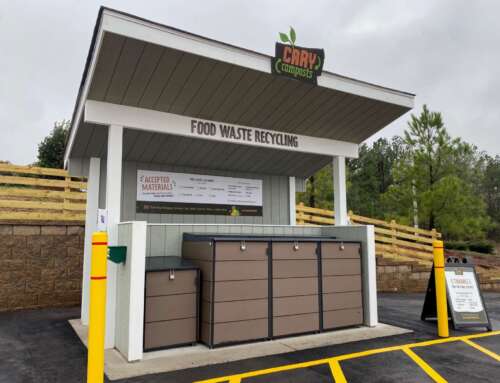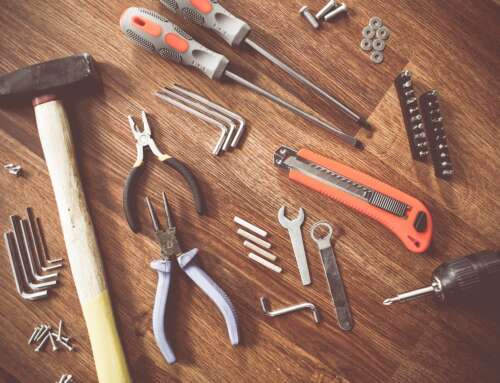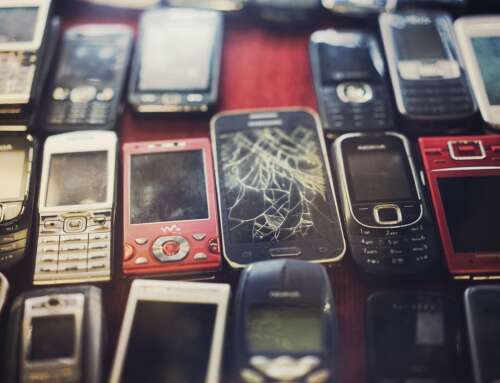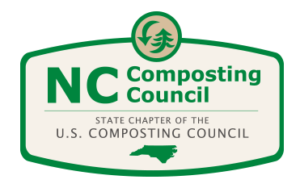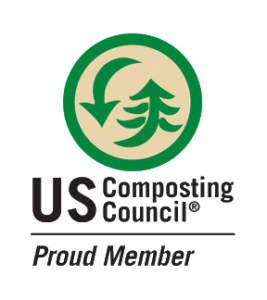My Green Bin Challenge: 6 months in!
My Green Bin Challenge: 6 months in!
Written By
It has been a long since I have updated on my Green Bin Challenge! I haven’t abandoned the project (although things have gotten a bit more difficult) just got super busy! It seems like things ramped up in April with Earth Day and I have not been able to slow down since!
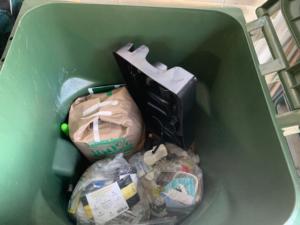
Bin about half full. Plastic is from new faucet install.
So, things were gong along really well and I felt like one big green bin for the year was a reasonable expectation for us. Then, we had a dietary change in the family. One child had been having some stomach issues and upon investigation, she was found to have sensitivities to dairy, eggs and gluten. Now, anyone with any one of these dietary restrictions knows that, unless you cook an awful lot, you are looking at lots of packaging, at least until you figure things out. (And as a side note, this is doubly difficult for me because I know packaging means lots of fake food. Not my thing.) This was the case for us. Our first trip to the grocery store after learning that she needed to drop these foods for at least a month was painful. We bypassed the bulk bins (where I usually get most of the ingredients I need to cook with) because there is no guarantee that they are not cross contaminated. Even something like flour, which is typically packaged in compostable paper packaging, when “gluten-free” is packaged in plastic to guarantee no cross-contamination. We bought gluten, egg and dairy free bars and cereals and breads, all packaged. Gluten, egg, and dairy free “milk” and “cheese” and ice cream, packaged. Even the yogurt we had been buying in quart sizes we could now only find in single size. Ugh.
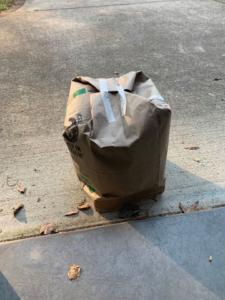
Paper bag taped shut.
Where we had been doing about an 8 gallon bag of trash monthly, now we were at one every 3 weeks or more often. I have still been able to source some things package-free (thank you Great Harvest with your gluten-less energy bars by the two dozen!) and I have learned to prepare some foods that fit the bill sans packaging. My husband still thinks we will make it a year, especially if we really try to compress the trash; it is all quite light weight and compressible, as it is by and large, of course, mostly plastic packaging. We shall see.
(Note: I have been gluten-free for medical reasons for two years now, but while I was able to simply give up gluten containing foods, for a kid who is a big fan of bread, pastas, baked goods and the like, it was simply asking too much. Guess I have to learn to bake gluten-free, or better yet, she will!)
No more bags?! So, in June, we used our very last plastic trash bag! It was from a large (500 I think?) lot of biodegradable Trellis Earth bags that we bought back when we moved into this house in 2012. I tried to confirm the amount and date, but apparently I did not buy them on Amazon, lol, and the company has since sadly gone out of business.
At any rate, what I didn’t know then is that putting our trash in a biodegradable bag and then putting it in the landfill to biodegrade was a misnomer. All of those bags of trash (all 500 of them) are likely still intact and will be for some time to come. “Biodegradable” is a term that means very little in the world of environmental protection, as everything will break down to some degree at some point. Even something that is certified compostable (a much more meaningful term) will not compost in an environment devoid of oxygen like a landfill.
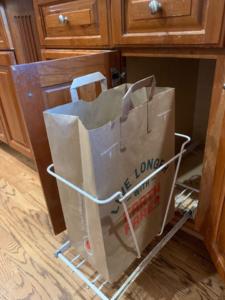
Paper grocery bag set up.
So, that leaves me with a choice: continue to purchase biodegradable plastic bags on the feel good factor alone (although it doesn’t feel nearly as good as it did before I became enlightened to greenwashing) or try something different. From my perspective, there are still advantages to choosing a more “green” product even though I know it likely will not go away: supporting earth conscious manufacturers, and supporting a less toxic manufacturing process are two that come to mind. And, after years of not using traditional plastic bags, I can’t see myself being able to purchase a box of Hefties! So, being that we have no need for a leak-free bag (no wet trash, thank you composting!) and being that I have a small stack of paper grocery or shopping bags that I’ve acquired over time, for now, I have chosen to use these paper bags that I will fasten with tape, or whatever I can get to work.
So that’s where we stand with the Green Bin Challenge and I am pretty satisfied so far. It really hasn’t been that hard (although do recognize that it took me nearly three years to build the habits, find products and connect with non-landfill disposal resources.) But the point is that it looks like I am going to get pretty close to my goal of one green curbside bin for the year!
See you all in my next update!
It has been a long since I have updated on my Green Bin Challenge! I haven’t abandoned the project (although things have gotten a bit more difficult) just got super busy! It seems like things ramped up in April with Earth Day and I have not been able to slow down since!

Bin about half full. Plastic is from new faucet install.
So, things were gong along really well and I felt like one big green bin for the year was a reasonable expectation for our family. Then, we had a dietary change in the family. One child had been having some stomach issues and upon investigation, she was found to have sensitivities to dairy, eggs and gluten. Now, anyone with any one of these dietary restrictions knows that, unless you cook an awful lot, you are looking at lots of packaging, at least until you figure things out. (And as a side note, this is doubly difficult for me because I know packaging means lots of fake food. Not my thing.) This was the case for us. Our first trip to the grocery store after learning that she needed to drop these foods for at least a month, was painful. We bypassed the bulk bins, where I usually get most of the ingredients I need to cook, because there is no guarantee that they are not cross contaminated. Even something like flour, which is typically packaged in compostable paper packaging, is packaged in plastic to guarantee no cross-contamination. We had gluten, egg and dairy free bars and cereals and breads, all packaged. Gluten, egg, and dairy free “milk” and “cheese” and ice cream, packaged. Even the yogurt we had been buying in quart sizes we could now only find in single size. Ugh.

Paper bag taped shut.
Where we were doing about an 8 gallon bag of trash monthly, now we were at one every 3 weeks or more often. I have been able to source some things package-free (thank you Great Harvest with your gluten-less energy bars by the two dozen!) and I have learned to prepare some foods that fit the bill sans packaging. My husband still thinks we will make it a year, especially if we really try to compress the trash; it is all quite light weight and compressible, as it is by and large, of course, plastic packaging. We shall see.
(Note: I have been gluten-free for medical reasons for two years now, but while I was able to simply give up gluten containing foods, for a kid who is a big fan of bread, pastas, baked goods and the like, it was asking too much. Guess I have to learn to bake gluten-free, or better yet, she will!)
No more bags?! So, in June, we used our very last plastic trash bag! It was from a large (500 I think?) lot of biodegradable Trellis Earth bags that we bought back when we moved into this house in 2012. I tried to confirm the amount and date, but apparently I did not buy them on Amazon, lol, and the company has since gone out of business.
At any rate, what I didn’t know then is that putting our trash in a biodegradable bag and then putting it in the landfill to biodegrade was a misnomer. All of those bags of trash (all 500 of them) are likely still intact and will be for some time to come. “Biodegradable” is a term that means very little in the world of environmental protection, as everything will break down to some degree at some point. Even something that is certified compostable (a much more meaningful term) will not compost in an environment devoid of oxygen like a landfill.

Paper grocery bag set up.
So, that leaves me with a choice: continue to purchase biodegradable plastic bags on the feel good factor alone (although it doesn’t feel nearly as good as it did before I became enlightened to greenwashing) or try something different. From my perspective, there are still advantages to choosing a more “green” product even though I know it likely will not go away: supporting earth conscious manufacturers, and supporting a less toxic manufacturing process are two that come to mind. And, after years of not using traditional plastic bags, I can’t see myself being able to purchase a box of Hefties! So, being that we have no need for a leak-free bag (no wet trash) and I have a small stack of paper grocery or shopping bags that I’ve acquired over time, I have chosen to use these paper bags for now that I will fasten with tape, or whatever I can get to work.
So that’s where we stand with the Green Bin Challenge and I am pretty satisfied so far. It really hasn’t been that hard (although do recognize that it took me nearly three years to build the habits, find products and connect with non-landfill disposal resources.) But the point is that it looks like I am going to get pretty close to my goal of one green curbside bin for the year!
Next in my updates I’ll explore what happened when I hired a professional minimalist declutterer to help me toward my goal of owning less!




